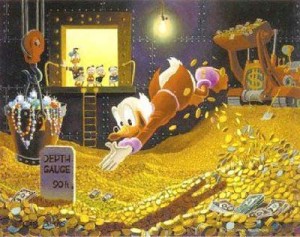Going All In on Apps
 I'm not as addicted as some, but in the 4.5 years I've had an iPhone, I've installed 498 apps. Not bad, but it really makes me want to go out and quickly find 2 more to make an even 500. Now, most of those have been free apps. I would be willing to guess that I've paid for less than 10% of all the apps I have installed. That means that not a whole lot of people have made very much money from app store sales.
I'm not as addicted as some, but in the 4.5 years I've had an iPhone, I've installed 498 apps. Not bad, but it really makes me want to go out and quickly find 2 more to make an even 500. Now, most of those have been free apps. I would be willing to guess that I've paid for less than 10% of all the apps I have installed. That means that not a whole lot of people have made very much money from app store sales.
Its pretty unlikely that I am out of the ordinary in this regard. One of my favorite authors, Dan Ariely, even wrote a chapter in his first book about how the price of free has an extremely strong influence on our decision making processes. Given the amount of money paid out to developers and the number of apps downloaded, its pretty obvious to me that most apps are either free, or they cost money but most people don't see enough value in the apps for them to make an actual purchase.
Knowing that the average app only nets a developer less than $7,000, why would you go into this business? Knowing that the median household income in the US is about $50,000, that means you would need to produce 7 apps per year just to be 'average'. Most developers starting out of college make more money than that. Lets assume you want to be making at least $75,000 per year, an average developers salary in most of the US outside tech hubs, then you need to make around 1 new app every single month.
That sounds not so bad... if you've never made an app before, much less a good app, which is a lot harder. Even more difficult is making an app that is so good, people will actually purchase it. Don't forget, you won't spend 160 hours per month making that new app, you're going to spend a significant portion, maybe a lot of that time, just supporting those old apps that are still 'making you money.' Lets assume you've got 100 hours this month to come up with an idea, code it, test it, create the graphical content for it, get it in the app store, promote it and make money off it, all before you need to start that grind all over next month.
Sound like a good time to you? No, not to me, either.
Yet lets say you have a passion, no, a burning desire, to live your life in exactly this way. Great! You know what, you need a Mac, an iOS device (preferably several of them) and an internet connection to do this. This is as low overhead as you can imagine to start your own business. So do you work on this in your spare time to see if it can work? Nope, you leave your jobs and go all in on apps.
Yes, I am unfairly singling out these people. Yes, its mean of me. Yes, I feel bad about it (not really). The truth is, I do have some admiration for their willingness to try and work themselves into a better life, I just wish they had been smarter about it.
See, I've been deeply involved with bringing some apps to market, all of which have been free apps and all of which have been successful. By no means do I claim to be an expert, but those app projects, combined with my experience of working on projects to bring out websites and other types of software, I've learned a couple of things which would have helped the people trying to make apps not lose their shirts. It really comes down to two rules and a corollary.
Rule #1... your idea can't suck. In fact, it has to be pretty amazing. Average just won't do. That's not to say that there are not a lot of average apps out there; in fact, I would go so far as to say that the majority of apps in the marketplace are average or worse. You can absolutely make some money off an average or below average app, you just won't be able to feed yourself and your family doing so.
Rule #2... your execution must be flawless. That's not to say that your app is bug-free and perfect; it won't be. It is to say that you executed the idea of your app so well that it is jaw-droppingly amazing. It needs to be so good that college students will want to come in to your offices, interview your staff and then write a paper about how you did it. If they're really smart kids, they'll write the paper about some sucker who failed badly and will keep the knowledge of how you did it to themselves so they can do you one better in a couple years.
 So now you've got a great idea and you've executed it to perfection. You're now Scrooge McDuck and rolling around in piles of cash, right? Not hardly. At this point, you're probably going to make enough money to pay back your investment in time, equipment and marketing, just enough to make you want to do this all over again. Congratulations, you just made it into the 1%... of people who didn't outright fail miserably. You're a success, but you're still pretty much broke. That year of work gained you a lot of notoriety and maybe enough knowledge, with a few new friends in the business, to make your second time around the block a bit less difficult, provided that you can find another great idea.
So now you've got a great idea and you've executed it to perfection. You're now Scrooge McDuck and rolling around in piles of cash, right? Not hardly. At this point, you're probably going to make enough money to pay back your investment in time, equipment and marketing, just enough to make you want to do this all over again. Congratulations, you just made it into the 1%... of people who didn't outright fail miserably. You're a success, but you're still pretty much broke. That year of work gained you a lot of notoriety and maybe enough knowledge, with a few new friends in the business, to make your second time around the block a bit less difficult, provided that you can find another great idea.
But wait, you say! Didn't Instagram sell to Facebook for like a BILLION dollars? My idea is soooo much better than that. I know I can make money on it!
I have no doubt that it is possible and that it could be done. That's where my corollary comes in to play... if you've got enough money to start with, you can toss both rules out the window. Lets look at Instagram... they were venture capital funded. What does that mean? That means that someone, in this case Kevin Systrom, had a pretty good idea. Someone, namely two venture capital funds, liked his idea and dropped him $500,000 to bring it to market. In return, those venture capitalists would take a large share in Systrom's company in the hopes that, one day, someone like Facebook would buy it for a boatload of money.
When you read the article in that last link, you realize that Systrom was never some guy working alone in his house. Since college, he's known some of the biggest players in the industry. Its no surprise that he made $1 billion dollars. What is a surprise is that a couple of people from no-where in suburbia think that they can quit their day-jobs, spend a few months sequestered in their attic office space and be the next Systrom. Even looking at Systrom's history, it took him 6 years of trial and effort to get his company off the ground and another 18 months to make it worth (or maybe be overvalued at) $1 billion. You can make a lot of money if you have enough money and people already lined up to help you. Your ideas may be good and your execution may be good, but having a raft of waiting cash helps cover over so many failures.
The problem with our couple who is trying to make it as independent app developers is that they've bought into a lie that anyone can do it. That's a lie. It takes a lot to get there and very few people ever will be make a living, much less the real minority who actually get rich, making apps. In the end, I feel sad that they've bought into this lie. There's nothing wrong with working a day job and there is nothing wrong with being a mildly successful app developer. Its the people who do not understand reality well enough that really make me sad.
That brings it all back around to the image at the top of this article of the elderly woman playing the slots. To me, seeing people who quit everything with the dream of making it rich in the app store are just like that older woman gambling away everything she's made in her life. She keeps slapping quarters into that machine, just like most independent app developers keep slapping mediocre apps into the store. Both groups know that the next one is the one that will hit it big, but its really the house that is taking it all.